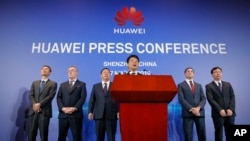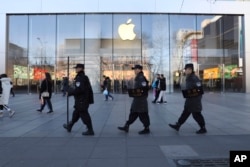China used the closing of its annual top-level political meetings, or “Two Sessions,” to send positive signals about its commitment to resolve trade tensions with Washington and push forward economic reforms.
Premier Li Keqiang also flatly denied U.S. warnings about the security risk Chinese tech giant Huawei poses, stating that Beijing will “never” ask companies to spy on other countries.
The Huawei dispute, tech rivalry and tit-for-tat tariffs in the trade war are all part of a perfect storm of tensions brewing between Beijing and Washington, tensions the two countries are trying to manage and address.
Huawei concerns
Speaking with journalists at his annual press conference Friday, following the close of the National People’s Congress, Premier Li addressed the nagging question of concerns that China’s authoritarian government would use Huawei to spy on other countries.
The United States has led a global charge in warning about the risks the company has posed. Washington has blocked Huawei from participating in the roll out of next generation (5G) mobile networks in America and urged other countries to follow suit.
As countries from Asia to Europe evaluate their position on the company, Li said China’s government has never asked and will not ask Chinese companies to spy in the future.
“This is not consistent with Chinese law and is not how China behaves,” he said.
Trade talks
Li said that while frictions exist and will continue between Washington and Beijing, shared interests between the two countries far outweigh their differences.
“China and the United States as two large economies have become closely entwined through years of growing their relationship and years of cooperation,” Li said. “It is neither realistic nor possible to decouple these two economies.”
Li said China would follow through on its reform pledges, including the implementation of regulations for a new foreign investment law. He added that China is also considering revising its intellectual property law. The Foreign Investment Law was passed Friday during the NPC’s closing session.
Analysts have said the law helps to address some key concerns trade negotiators are grappling with, such as equal market access and forced technology transfers. But how it will be implemented is key.
Li said that China will honor its commitments to continue pushing ahead with opening up and reform. He also said he was confident U.S.-China relations would keep moving forward and voiced hope that negotiators could achieve results in their trade talks.
Shortly before Li’s press conference, the official state-run Xinhua news agency released a brief on the talks and a telephone conversation between China’s top trade negotiator, Chinese Vice Premier Liu He, and U.S. Trade Representative Robert Lighthizer and U.S. Treasury Secretary Steven Mnuchin.
“The two sides have made further concrete progress on the text of the trade agreement,” Xinhua said. It did not elaborate.
Still, as U.S. China trade talks push on, there continues to be mixed signals about the likelihood of a possible positive outcome.
The Xinhua report and Li’s remarks are a positive uptick. Earlier this month, a hike in tariffs was put on hold because of promising progress, but U.S. officials have recently noted that “major issues” remain. It is also unclear if the two countries’ leaders may soon meet.
President Donald Trump and China’s leader Xi Jinping were originally expected to meet at the end of March to sign an anticipated deal, but now that has reportedly been pushed back to sometime in April.
Getting to a final agreement will not be easy and the question of enforcement and follow up will be key. The talks and tensions stretch far beyond trade and tariffs.
“Now both China and the United States need to come up with a strategy, consider how to coexist harmoniously with each other for a long time, and form a new world order and that is not easy,” noted Han Jialiang, an independent scholar in Australia.








